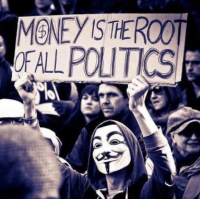U.S. Appeals Court Rules Political “Charities” Must Disclose Donors to California

Mega-rich political donors and the conservative pundits who most fiercely defend them have a phrase to describe the mental illness that compels people to seek transparency in government and the electoral system: “Lois Lerner Syndrome.”
Lerner, an IRS official vilified by those on the right for perceived political persecution by the agency, was invoked by the Washington Times in describing a lawsuit brought against California Attorney General Kamala Harris last year by the Virginia nonprofit Center for Competitive Politics (CCP).
She wanted to know who their major donors were and they wanted her to stop asking. Although the state could have been asking for the names since 2001, it didn’t until 2013.
Last week, the U.S. Ninth Circuit Court of Appeals sided with Harris (pdf) and upheld a lower-court decision that the law empowered her to ask for donor names as a condition of inclusion in the state’s Registry of Charitable Trusts and eligibility for tax-deductible donations.
The IRS gives the center a tax break as an educational organization whose “mission is to promote and defend the First Amendment rights of free political speech, assembly, association and petition through research, education, and strategic litigation.”
Charities help those in need. The center accomplishes that by funneling large amounts of money into political campaigns that promote the deregulation of elections and destruction of campaign finance laws. The center was founded in 2005 by Bradley Smith, a former Clinton appointee to the Federal Election Commission (FEC).
Attorneys for the center argued that its donors’ First Amendment freedom of association was abridged by having to convey information to the state that puts them at risk of public attack. The argument was somewhat undercut by the fact that the state is simply asking for the same information already furnished to the IRS for tax purposes and, like the IRS, pledges to keep it private.
That doesn’t mean the state won’t look at the information. The court recognized its responsibility “to protect charitable assets for their intended use” and bought Harris’ argument that “such information is necessary to determine whether a charity is actually engaged in a charitable purpose, or is instead violating California law by engaging in self-dealing, improper loans, or other unfair business practices.”
The center also lost the argument that federal law preempts California’s disclosure requirement.
Charitable political nonprofits came under increased scrutiny after the November 2012 election, when mysterious, last-minute million-dollar donors targeted Governor Jerry Brown's Proposition 30 tax hike for defeat and supported the anti-union Proposition 32.
Americans for Prosperity, a right-wing political advocacy group founded by the billionaire Koch brothers David and Charles, filed a lawsuit similar to CCP’s that received a more favorable response from U.S. District Judge Manuel Real in February.
He temporarily blocked Harris, a Democrat, from getting names, unconvinced that the state had laws in place to protect donor identities from public inquiries once they were in its hands. Real said he wanted to see how the issue was adjudicated at higher levels before making a final ruling. That just happened.
The Koch brothers have pledged to raise and distribute $1 billion through its political network for the 2016 presidential election. Harris is a candidate for the soon-to-be-vacant Senate seat occupied by Democrat Barbara Boxer.
–Ken Broder
To Learn More:
California Charities Must Disclose Major Donors, Court Rules (by Maura Dolan, Los Angeles Times)
Do Even the Koch Brothers Deserve Some Privacy? (by Ciara Torres-Spelliscy, Brennan Center for Justice)
Koch Brothers Group Sues State to Keep Political Donor Names Hidden (by Ken Broder, AllGov California)
Koch Group Gets to Keep Donors Secret in California Lawsuit (by Edvard Pettersson, BloombergBusiness)
Center for Competitive Politics v. Kamala Harris (U.S. Court of Appeals for the Ninth Circuit) (pdf)
- Top Stories
- Controversies
- Where is the Money Going?
- California and the Nation
- Appointments and Resignations
- Unusual News
- Latest News
- California Forbids U.S. Immigration Agents from Pretending to be Police
- California Lawmakers Urged to Strip “Self-Dealing” Tax Board of Its Duties
- Big Oil’s Grip on California
- Santa Cruz Police See Homeland Security Betrayal in Use of Gang Roundup as Cover for Immigration Raid
- Oil Companies Face Deadline to Stop Polluting California Groundwater





